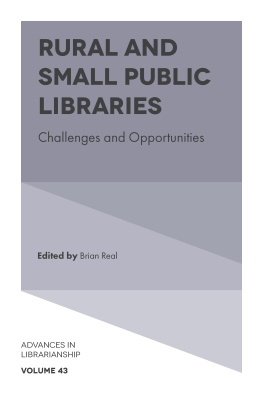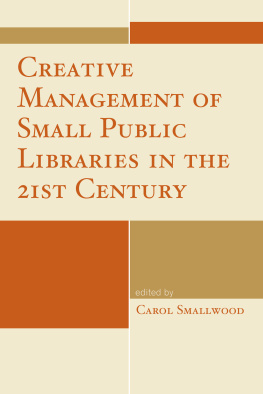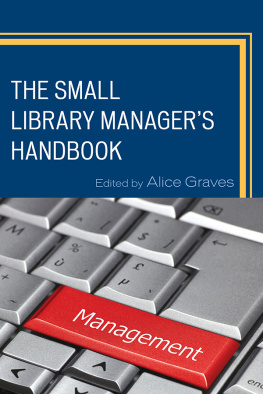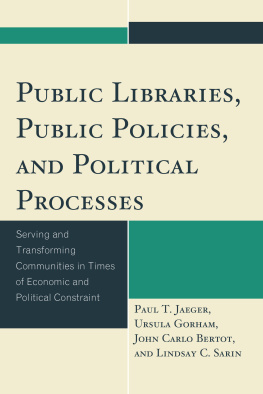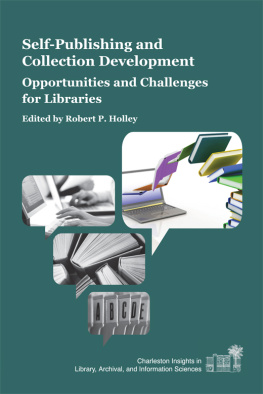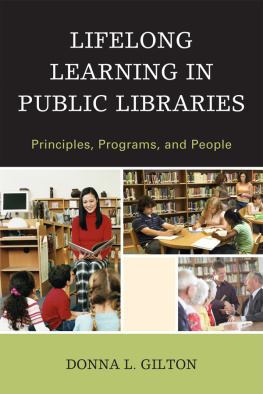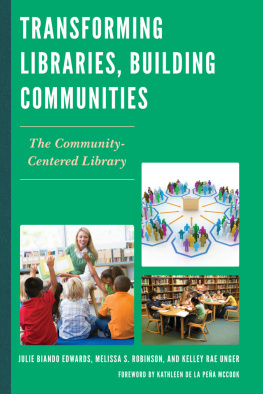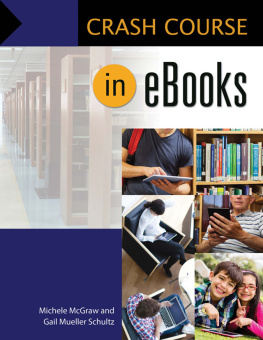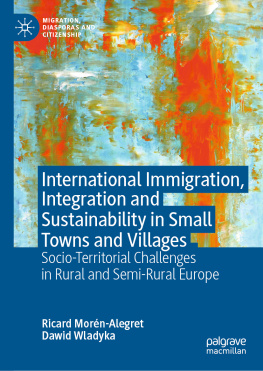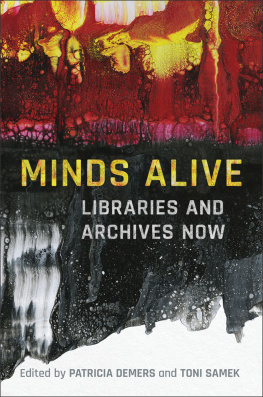RURAL AND SMALL PUBLIC LIBRARIES: CHALLENGES AND OPPORTUNITIES
ADVANCES IN LIBRARIANSHIP
RURAL AND SMALL PUBLIC LIBRARIES: CHALLENGES AND OPPORTUNITIES
Edited by: Brian Real
Advances in Librarianship Volume 43
Advances in Librarianship Editors
Paul T. Jaeger, University of Maryland, Series Editor
Caitlin Hesser, University of Maryland, Series Managing Editor
Advances in Librarianship Editorial Board
Denise E. Agosto, Drexel University
Wade Bishop, University of Tennessee, Knoxville
John Buschman, Seton Hall University
Michelle Caswell, University of California, Los Angeles
Sandra Hughes-Hassell, University of North Carolina, Chapel Hill
R. David Lankes, University of South Carolina
Don Latham, Florida State University
Ricardo L. Punzalan, University of Maryland
Lynn Westbrook, University of Texas
ADVANCES IN LIBRARIANSHIP VOLUME 43
RURAL AND SMALL PUBLIC LIBRARIES: CHALLENGES AND OPPORTUNITIES
EDITED BY
BRIAN REAL
Public Services Librarian, Calvert Library,
Prince Frederick, MD, USA

United Kingdom North America Japan
India Malaysia China
Emerald Publishing Limited
Howard House, Wagon Lane, Bingley BD16 1WA, UK
First edition 2018
Copyright 2018 Emerald Publishing Limited
Reprints and permissions service
Contact:
No part of this book may be reproduced, stored in a retrieval system, transmitted in any form or by any means electronic, mechanical, photocopying, recording or otherwise without either the prior written permission of the publisher or a licence permitting restricted copying issued in the UK by The Copyright Licensing Agency and in the USA by The Copyright Clearance Center. Any opinions expressed in the chapters are those of the authors. Whilst Emerald makes every effort to ensure the quality and accuracy of its content, Emerald makes no representation implied or otherwise, as to the chapters suitability and application and disclaims any warranties, express or implied, to their use.
British Library Cataloguing in Publication Data
A catalogue record for this book is available from the British Library
ISBN: 978-1-78743-112-6 (Print)
ISBN: 978-1-78743-111-9 (Online)
ISBN: 978-1-78743-253-6 (Epub)
ISSN: 0065-2830 (Series)

EDITORS DEDICATION
I have learned basically everything I know about public libraries through two major parts of my life: my work as a Public Services Librarian with the Calvert Library, a rural public library system in southern Maryland, and my work as a research associate on the Digital Inclusion Survey at the Information Policy and Access Center (iPAC) at the University of Marylands iSchool. This book is dedicated to my colleagues at both organizationsand especially Professor John Carlo Bertot of iPACas I would not have the knowledge or skills needed to oversee this volume without them.
I would also like to acknowledge my wife, Dr. Sarah Cantor, whose love and support has been essential in guiding me through writers block and other crises, both major and minor.
CONTENTS
Paul T. Jaeger and Caitlin Hesser
Brian Real
Claire Petri
Brian Real and R. Norman Rose
Karen Miller
Bharat Mehra, Bradley Wade Bishop, and Robert P. Partee II
Bharat Mehra, Vandana Singh, Natasha Hollenbach, and Robert P. Partee II
Travis L. Wagner and Bobbie Bischoff
Jennifer L. Jenkins
Jennifer L. Jenkins, Guillermo Quiroga (Yaqui), Kari Quiballo (Sioux), Herman A. Peterson (Din), and Rhiannon Sorrell (Din)
ABOUT THE CONTRIBUTORS
Bobbie Bischoff , University of South Carolina, is a doctoral student in the School of Library and Information Science at the University of South Carolina. Bobbie has earned an AGS in history from Brazosport College (TX), a bachelors in interdisciplinary studies from the USCLancaster, and an MLIS from USCColumbia. She has extensive experience as a teacher-librarian in Charleston County and has also worked as a mechanical engineering technician in the Nuclear Power Industry and as an aquatics director at Leroy Springs Recreation Complex. Her research interests are at the intersection of archives (as a memory institution), management of the record, the cultural pursuit of knowledge to facilitate memory, and the transmission of memory within the material culture. In addition to her work as an aquatics instructor, she developed and taught numerous professional development courses in Charleston County School District and was an adjunct instructor at Charleston Southern University, where she developed and taught the first Web-based technology course.
Bradley Wade Bishop , University of Tennessee, is an associate professor in the School of Information Sciences at the University of Tennessee. Bishops research focus is on geographic information (GI) organization, access, and use, and his educational focus is on bolstering the curation, preservation, and metadata creation of GI. He has published several articles utilizing GI systems as a tool in the analysis of public libraries. He has published works related to public libraries in Library and Information Science Research, Public Libraries, Public Library Quarterly, Government Information Quarterly, Library Quarterly, Library Trends, Journal of the American Society for Information Science and Technology, Journal of Education for Library and Information Science, College and Research Libraries, and Portal: Libraries and the Academy.
Natasha Hollenbach , University of Tennessee, is a recent graduate from the masters program in the School of Information Sciences at the University of Tennessee. Hollenbach was a student assistant hired to conduct action research with rural libraries in the Southern and Central Appalachian region.
Jennifer L. Jenkins , University of Arizona, is a professor of English at the University of Arizona. Jenkins teaches film history and theory, literature, and archival practice at the University of Arizona. She is the founder of Home Movie Day Tucson and regularly lays student hands on film of many gauges. She is the outgoing director of the Northeast Historic Film Summer Symposium. Since 2011, she has been Curator of the American Indian Film Gallery, a digital humanities project that seeks inclusive repurposing of mid-century films about Native peoples of the Americas. In a process termed tribesourcing, we invite Native narrators to record new audio files for the films in indigenous or/and European languages to provide culturally competent counter-narratives to the films, thereby expanding access and enriching the collections information base. In 2017, this project was awarded funding by the National Endowment for the Humanities.
Bharat Mehra , University of Tennessee, is an associate professor in the School of Information Sciences at the University of Tennessee. Mehras research examines diversity and intercultural communication, social justice in library and information science, critical and cross-cultural studies, and community informatics or the use of information and communication technologies to empower minority and underserved populations to make meaningful changes in their everyday lives. Mehra has collaborated with racial/ethnic groups, international communities, sexual minorities, rural librarians, and small businesses to represent their experiences and perspectives in shaping the design and development of community-based information systems and services. He primarily teaches courses on public library management, collection development, resources and services for adults, diversity services in libraries, and grant development for information professionals.

